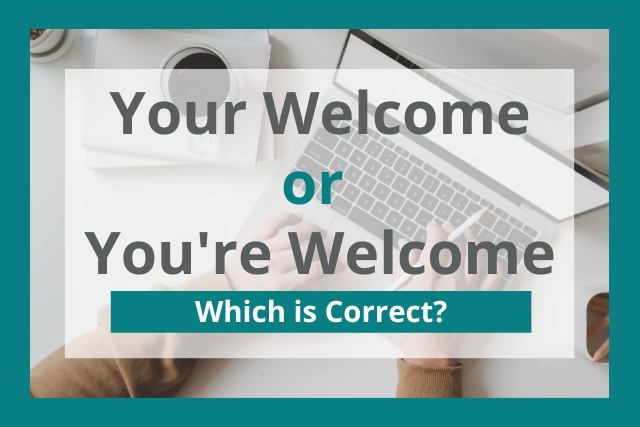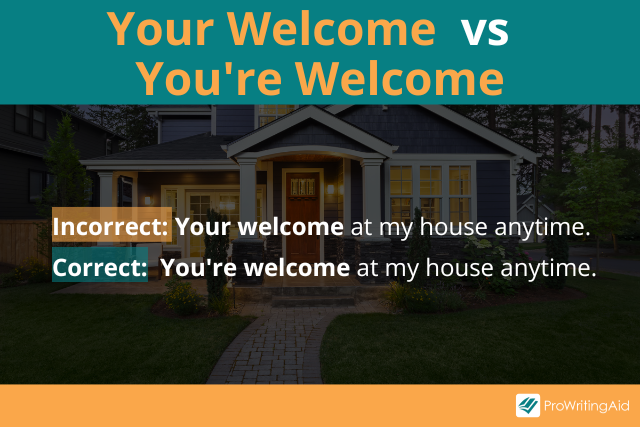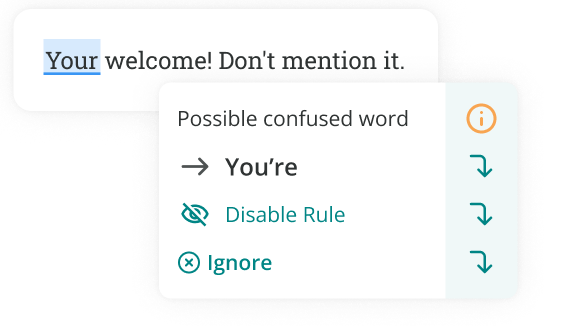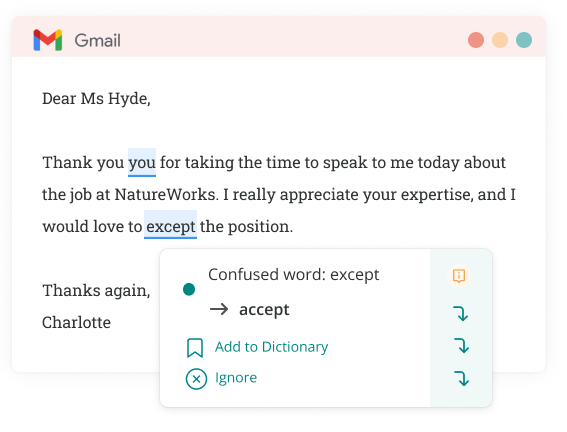
Your and you’re are two words that are easily confused, even by native English speakers. They’re pronounced the same way, but they have very different meanings and play different roles in a sentence.
So should you write your welcome or you’re welcome?
The correct answer is you’re welcome because this phrase is a shortened version of “you are welcome,” and you’re is a contraction of “you are.”
Read on to learn more about your welcome vs you’re welcome and how to remember the correct spelling, along with some you’re welcome example sentences.
Is It Your Welcome or You’re Welcome?
You’re welcome is a polite response you can use after someone says “thank you” or expresses their gratitude to you. It’s also a way to show someone that they’re welcome in a specific place or situation.
You should always write you’re welcome with an apostrophe and an E at the end of you’re, rather than your welcome without an apostrophe or an E.
Your Welcome vs You’re Welcome Grammar
To understand why you’re welcome is correct and your welcome is incorrect, we have to look at the function of your vs you’re.
The word your is a possessive pronoun. You can use your to indicate that something belongs to the person being addressed. For example, you might say, “Do you like your new book?”
The word you’re is a contraction of the phrase you are. You can use it whenever you would use you are. For example, you might say, “You’re very kind.”

The phrase you’re welcome includes the word are because its purpose is to tell someone they are welcome. The full version of you’re welcome is “you are welcome.”
Therefore, the right way to spell this sentence is you’re welcome, not your welcome.
How About Ur Welcome?
In informal text conversations, you might see ur used as a slang abbreviation for both your and you’re.
When you see ur written in lowercase without a space between the two letters, it usually means “your.” When you see U R written in capital letters with a space, it usually means “you are.” Both abbreviations can replace you’re in the phrase you’re welcome.
Most people only accept the spelling ur welcome when texting family and friends, as it’s considered very informal. In professional and more formal contexts, stick with the correct full spelling, you’re.
Your Welcome Example Sentences
The best way to learn English spelling and grammar for any writer is by reading examples of a word in action. Here are a few you’re welcome example sentences.
A conversation between a secretary and his boss:
- Secretary: Don’t forget about your dentist appointment at 2pm tomorrow.
- Boss: I forgot I had that appointment booked! Thank you for the reminder.
- Secretary: You’re welcome. I already added it to your calendar.
A conversation between two friends:
- Person 1: Do you want to come over for dinner tonight?
- Person 2: Are you sure your parents won’t mind if I come over?
- Person 1: Of course they won’t mind! My parents think of you as a friend. You know you’re welcome at my house anytime.
A conversation between a business owner and a client:
- Business Owner: Here’s a description of the product we sell.
- Client: That looks interesting! I’m not sure it would suit me, though.
- Business Owner: Do you want a free sample? You’re welcome to try it out before you commit to a subscription.
Remember the Difference Between Your Welcome vs You’re Welcome
The easiest way to remember how to spell your vs you’re correctly is to remember that you’re is a contraction of you are. The apostrophe in you’re stands in for the missing A in are.
Try switching the word out for the phrase you are. If you can replace the word with you are, then the correct spelling is the contraction you’re. If you can’t, then the correct spelling is your.
This rule applies to the phrase you’re welcome and any other sentence containing your or you’re.

If you’re not sure you’re using the right word, then you’re welcome to run your writing through ProWritingAid, which will catch spelling and grammar errors for you.
Ready to Improve Your Writing? Try ProWritingAid.


